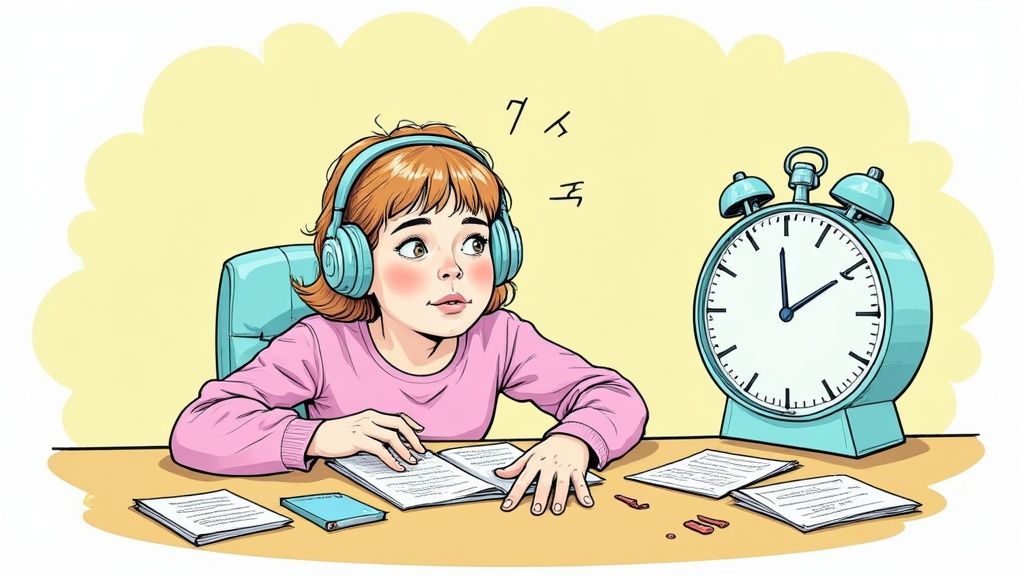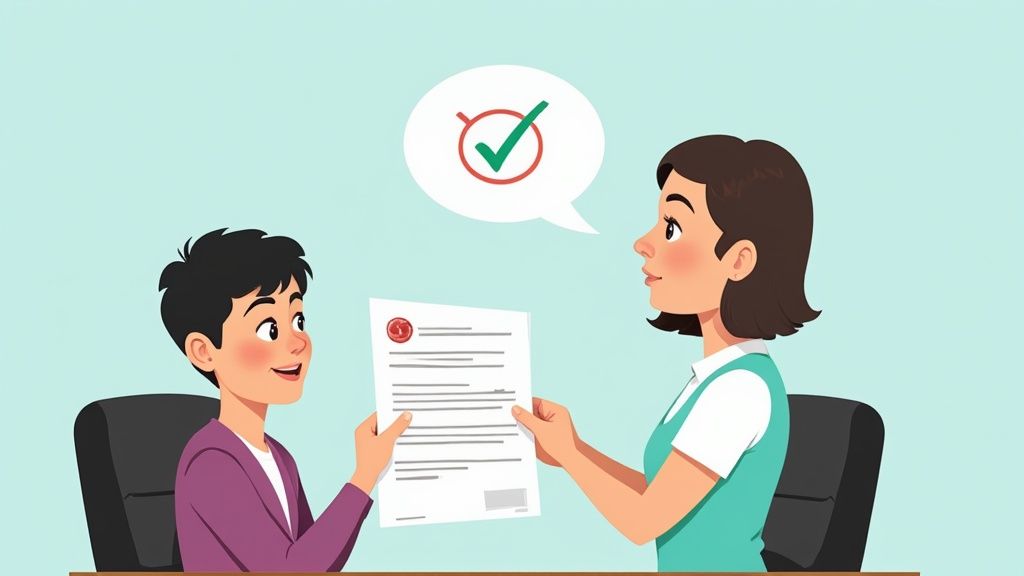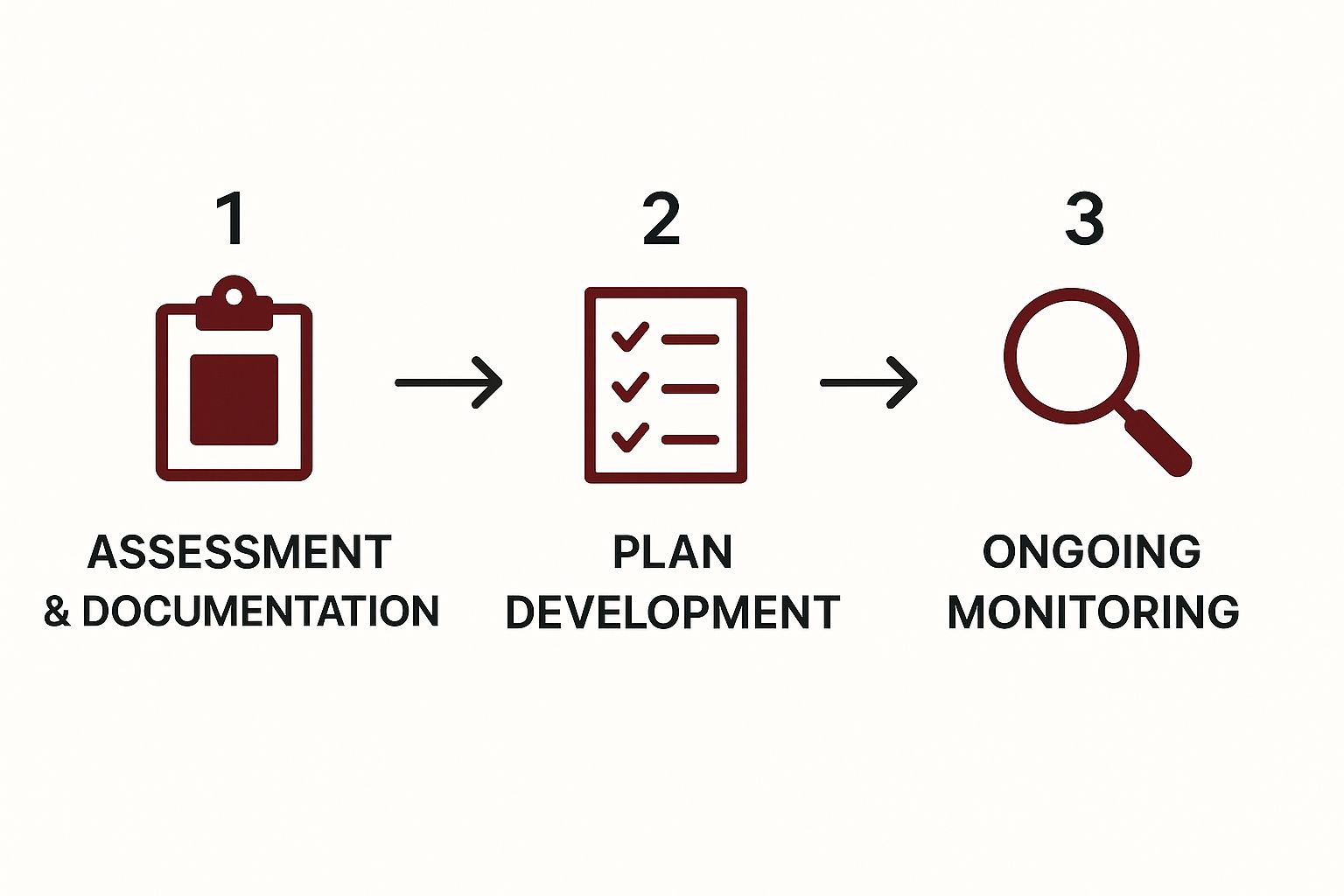It’s easy to misunderstand academic accommodations for ADHD. Many people think of them as special advantages, but that couldn’t be further from the truth. They are simply essential tools designed to level the academic playing field.
Think of it this way: you wouldn't tell a student who needs glasses that they're getting an unfair leg up by being able to see the board. Accommodations work the same way. They don't make a test easier; they just give a student with ADHD an equal chance to show what they know. These supports are all about modifying how students learn and are tested to work around the very real challenges of ADHD.
Why Accommodations Create Equal Opportunity
For a student with ADHD, a traditional classroom can feel like running a race where your starting line is ten feet behind everyone else's. This has nothing to do with a lack of intelligence or effort. It's a result of neurologically-based challenges with executive functions—the brain’s management system for things like focus, organization, and time management.
Academic accommodations are the adjustments that move that starting block up to the same line as their peers.
Bridging the Executive Function Gap
These supports aren’t about changing what a student learns, but how they're able to learn and demonstrate it. The whole point is to remove the barriers created by ADHD symptoms so the student's true academic abilities can finally shine through.
Here are a few common ways accommodations make a real difference:
- Addressing Time Blindness: Extended time on tests is a huge help for students who process information differently or struggle to pace themselves when the pressure is on.
- Improving Focus: A quiet testing environment is a game-changer. It minimizes the distractions that can be a major hurdle for a brain that gives equal importance to the professor's lecture and a tapping pen three rows back.
- Supporting Organization: Getting permission to use a note-taker or record lectures ensures that key information isn't lost simply because of challenges with sustained attention.
These adjustments are legally protected under laws like the Americans with Disabilities Act (ADA). This makes them a right, not a privilege, and ensures a student is graded on their grasp of the material, not the limitations imposed by their neurotype.
While accommodations are a cornerstone of academic success, it's helpful to see them as just one piece of a bigger puzzle. A 2021 systematic review found that while supports like read-aloud options show promise, many accommodations work best when they're paired with other evidence-based strategies like skill-building and therapy. You can read more about these findings on educational accommodations to get the full picture.
Understanding Your Eligibility for Accommodations
So, where do you start with securing academic accommodations for ADHD? It all begins with one foundational step: a formal diagnosis.
Think of an official diagnosis as the key that unlocks the entire process. Without it, schools simply have no basis to consider your request for support.
But just having the key isn't quite enough. You also have to show why you need to open that particular door. A diagnosis confirms you have ADHD, but it doesn’t automatically spell out how it impacts your performance in a classroom or lecture hall. This is where the crucial idea of functional impairment comes in.
Proving Functional Impairment
Functional impairment is the bridge that connects your diagnosis to your need for accommodations. It’s on you to clearly show how specific ADHD symptoms—like trouble with sustained focus, time management, or staying organized—create real, tangible barriers to your learning.
It’s about painting a clear picture for the school's disability services office.
For instance, just saying "I have ADHD" is far less powerful than explaining, "My challenges with executive functioning make it incredibly difficult to organize and start long-term projects, which often leads to missed deadlines even when I fully understand the material." That specific connection is what makes your case so compelling. You can get a better sense of how a comprehensive evaluation builds this case in our guide on how ADHD is diagnosed.
It's not just about having a condition; it's about showing how that condition substantially limits a major life activity—like learning, concentrating, or thinking—in an educational context.
To prove this, schools require very specific documentation. The quality and completeness of this evidence are often the deciding factors in whether your request gets approved.
Essential Documentation for Your Application
Gathering the right paperwork is non-negotiable. While the exact requirements can differ a bit from one institution to the next, they generally look for a consistent set of documents to validate your diagnosis and its impact on your academic life.
Your documentation portfolio should typically include:
- A Psychoeducational or Neuropsychological Evaluation: This is the gold standard. It’s a comprehensive report from a qualified professional that details your cognitive strengths and weaknesses, along with a clear diagnosis backed by data.
- A Letter from a Medical Professional: This can be a letter from your doctor or psychologist confirming the diagnosis, outlining your symptoms, and recommending specific, helpful accommodations.
- Proof of Prior Accommodations: If you had an IEP or 504 plan in high school, this history is incredibly powerful evidence. It establishes a documented need for support over time.
Interestingly, the decision isn't always just about the hard data. A 2022 study found that Disability Services Offices often lean heavily on student self-reports and professional recommendations. In one scenario, 100% of decision-makers approved extended test time without any objective performance data, which really highlights the weight given to your personal story and professional support.
Common Accommodations That Make a Difference
Realizing you need support is the first step, but figuring out what kind of help is actually available can feel like a whole other challenge. Academic accommodations for ADHD aren't a one-size-fits-all prescription. Think of them more like a toolkit, with specific tools designed to address the unique challenges that come with executive function deficits.
These supports generally fall into three buckets: help for testing situations, adjustments to the classroom environment, and modifications for assignments and coursework. Each one is meant to smooth out a different part of the academic journey, creating a fairer opportunity to show what you know.
To give you a clearer picture, here’s a breakdown of some common accommodations and how they directly address the hurdles ADHD can create.
Common ADHD Accommodations and Their Purpose
| Accommodation Type | Example | Purpose and ADHD Challenge Addressed |
|---|---|---|
| Testing | Extended Time | Addresses slower processing speed and time blindness by giving the brain more room to think without the pressure of a ticking clock. |
| Testing | Quiet/Private Room | Minimizes auditory and visual distractions, which is a game-changer for a brain that struggles to filter out background noise. |
| Testing | Scheduled Breaks | Fights mental fatigue and helps reset focus, combating the difficulty with sustained attention during long exams. |
| Classroom | Note-Taking Assistance | Fills in the gaps when attention inevitably drifts, ensuring crucial information isn't missed during a lecture. |
| Classroom | Permission to Record | Allows for reviewing material later, which is perfect for reinforcing learning and catching details missed the first time. |
| Classroom | Preferential Seating | Reduces distractions from classmates and makes it easier to stay engaged by being closer to the instructor and the board. |
| Assignments | Flexible Deadlines | Provides a buffer when executive function challenges with planning and initiation get in the way of meeting a rigid deadline. |
| Assignments | Breaking Down Projects | Helps overcome the overwhelm and procrastination that often come with large, multi-step assignments by making them feel more manageable. |
| Assignments | Alternative Formats | Allows students to demonstrate knowledge in a way that aligns with their strengths (e.g., orally vs. written), bypassing a specific area of weakness. |
These examples show how each accommodation is thoughtfully designed to level the playing field, not to provide an unfair advantage. Let's dig a little deeper into each category.
Testing Accommodations
High-stakes exams are notorious for amplifying ADHD symptoms. The pressure, the silence, the clock ticking down—it’s a perfect storm for issues like time blindness and distractibility to take over. Testing accommodations are all about dialing down that pressure.
- Extended Time: This is a classic. Often 50% additional time, it directly tackles the challenge of slower processing speed. It gives you the space to read, think, and formulate answers without feeling the constant need to rush.
- Quiet or Private Testing Room: For many, this is the single most effective support. It eliminates the coughs, clicks, and movements that can derail a train of thought, which is critical for a mind that struggles to filter out irrelevant stimuli.
- Allowance for Breaks: Sitting still and focusing for hours on end is a massive challenge. Short, scheduled breaks can be a lifeline, helping to reset focus and manage the mental burnout that comes with sustained concentration.
These tweaks don't make the test any easier, but they do make sure the environment isn't the reason you struggle.
Classroom and Lecture Accommodations
The standard lecture hall can feel like an obstacle course for a student with ADHD. Trying to maintain focus, scribble down notes, and tune out your neighbor's typing requires an enormous amount of energy.
These in-class supports are designed to help with information intake and processing. The goal is to ensure the student doesn't miss crucial information due to challenges with attention or auditory processing.
Here are a few ways the classroom can be made more ADHD-friendly:
- Note-Taking Assistance: Whether it’s getting a copy of a peer’s notes or the instructor's slides beforehand, this helps fill in the blanks that appear when your focus naturally drifts.
- Permission to Record Lectures: An audio recorder or a smartpen can be a lifesaver. It lets you revisit the material on your own time, which is an incredible tool for cementing your understanding and catching things you missed.
- Preferential Seating: A simple seat at the front of the room can work wonders. It shrinks the field of potential distractions and keeps you visually locked in with the instructor.
For a more thorough look at these strategies, our guide on ADHD classroom accommodations offers some great insights.
Assignment Accommodations
Big projects and long papers can be kryptonite for ADHD brains. The executive function skills needed for planning, organizing, and just starting are often the ones that are most impaired.
- Flexible Deadlines: This isn’t a get-out-of-jail-free card. Instead, it’s a recognition that sometimes life and executive dysfunction get in the way, providing a reasonable cushion when you need it.
- Breaking Down Large Projects: The sheer scale of a 20-page paper can be paralyzing. Having an instructor help break it down into smaller pieces with their own due dates (outline, first draft, etc.) makes the whole thing feel achievable.
- Alternative Formats: Sometimes, the format is the barrier, not the content. Being allowed to give an oral presentation instead of writing an essay lets you showcase your knowledge in a way that plays to your strengths.
Your Step-by-Step Guide to Securing Support
Knowing what academic accommodations for ADHD are out there is one thing, but actually getting them is a whole different ballgame. The process can feel a little intimidating, but if you break it down into clear, manageable steps, it's much easier to handle. Think of this as your action plan for turning your diagnosis into a real support system at school.
The very first step is to find the right office on campus. It usually goes by a name like the Disability Services Office or the Student Accessibility Center. This office will be your main partner and advocate for your entire academic career, so it’s the best place to start.
Starting the Interactive Process
Once you've located the office, your next move is to set up a meeting. This isn't a test or an interrogation—it's a conversation. You'll sit down with an advisor, go over your documentation, and talk about the specific ways ADHD creates challenges for you in your classes.
You’ll want to be ready to explain your needs clearly. For example, instead of just saying, "I have trouble with tests," try something more specific like, "The time pressure on exams makes it really hard for me to organize my thoughts. I end up losing points even when I know the material." Being specific helps the advisor connect your experience to the accommodations that will actually help.
This back-and-forth conversation is what’s known as the interactive process. It’s where you and the disability services professional work together to figure out a personalized accommodation plan that fits you.
This infographic breaks down the core phases of the accommodation process, from the first assessment to the ongoing support you'll receive.
As you can see, getting accommodations isn't a one-and-done deal. It's a continuous cycle of planning, putting those plans into action, and tweaking them as you go.
Implementing and Advocating for Your Plan
After your plan is approved, the school will give you an official accommodation letter. This letter is your golden ticket for activating your supports, but here’s the key part: it's your responsibility to share it with your professors.
It’s a common misconception that the disability office handles all the communication with instructors. You are your own best advocate in this process. Your job is to deliver the letter and have a quick, proactive chat with each professor about how to put your accommodations in place for their class.
Here’s a simple checklist to manage this part like a pro:
- Deliver Your Letter Early: Get your accommodation letter to your professors at the very beginning of the semester. Don't wait until the first exam is a week away.
- Schedule a Brief Meeting: Pop into their office hours to make sure they got the letter and to quickly discuss how accommodations, like extended time, will work for their specific tests or assignments.
- Follow Up in Writing: After you chat, send a polite email confirming what you talked about. This creates a paper trail, which is always a good idea.
- Contact Disability Services if Issues Arise: If a professor doesn't respond or seems unwilling to provide an approved accommodation, get in touch with your disability services advisor right away. They'll step in and help sort things out.
The spirit of this process is a lot like creating a 504 plan in K-12, where proactive planning is everything. To see what these kinds of documents look like, you can check out a helpful 504 plan template for ADHD to get a feel for the principles behind formalizing support.
Building Your Success Toolkit Beyond Accommodations
Think of formal academic accommodations as the guardrails on a winding mountain road. They're absolutely essential for keeping you safe and on track, but they don't drive the car for you. Lasting success in school and beyond comes from pairing these crucial supports with your own personalized toolkit of strategies and habits.
This is about moving beyond just having support and toward building genuine self-reliance. It means getting curious and experimenting with different ways to manage your time, organize your projects, and study effectively. The goal is to discover what actually clicks with your unique brain.
Developing Personal Strategies and Skills
The most powerful approach is to layer practical, real-world tools on top of your formal accommodations. When you do this, you’re building a personalized system that props up your executive functions and turns big, scary goals into small, doable actions.
Try incorporating some of these into your daily routine:
- Time Management Systems: The Pomodoro Technique is a game-changer for many. You work in focused 25-minute sprints, then take a short break. This simple trick helps fight time blindness and makes marathon study sessions feel way less intimidating.
- Organizational Apps: Digital tools are your best friend. Apps like Trello, Asana, or even a well-organized Google Calendar can be lifesavers. Use them to map out big projects, set reminders for deadlines, and keep everything for your classes in one place.
- Executive Function Coaching: Working one-on-one with a coach can provide tailored strategies and, just as importantly, accountability. A good coach helps you build systems for planning and prioritizing that are designed specifically for how you think.
Self-advocacy might be the single most important skill you can learn. It’s about knowing what you need and being able to communicate that clearly and confidently to professors and staff. This skill is your key to making sure your accommodations are actually working for you and getting help when you hit a roadblock.
Why Students Don't Always Use Their Accommodations
It might sound strange, but getting accommodations approved is one thing; using them is another. Many students don't take advantage of them all the time, which is exactly why developing your own strategies is so critical.
A fascinating study on college students with ADHD found that while 20.7% received academic accommodations, the average usage rate was only 61.7%. Why the gap? Researchers found students sometimes felt self-conscious or decided a specific assignment didn't require the extra support. You can read more about why accommodation usage varies among students.
This tells us that having accommodations isn’t a magic wand. The students who truly thrive are the ones who learn to be strategic. They build a flexible toolkit, pulling out formal accommodations when they’re most needed and relying on their own hard-won skills the rest of the time. This powerful combination of outside support and inside skill is the real foundation for success.
A Few Common Questions About ADHD Accommodations
Navigating the world of academic accommodations for ADHD can feel like learning a new language. It's totally normal to have questions. Getting clear, direct answers is the best way to feel confident and prepared, so let's tackle some of the most common ones we hear from students and parents.
Will Accommodations Show Up on My Transcript?
This is a huge concern for many, and the answer is a simple, resounding no. Rest assured, receiving academic accommodations is confidential and protected by federal privacy laws like the Americans with Disabilities Act (ADA).
Your use of disability services, the specific supports you get, and your ADHD diagnosis will never appear on your official transcript, diploma, or any other permanent academic record. This information is kept completely private to protect you from any potential discrimination.
Do I Have to Tell My Professors I Have ADHD?
Nope, you are not required to disclose your specific diagnosis to your instructors. The whole system is designed to protect your privacy while making sure you get the support you need to succeed.
Here’s how it works: the disability services office will provide you with an official letter or email. This document simply lists your approved accommodations, like "extended time on exams," without ever mentioning ADHD. You'll share this letter with your professors and have a quick chat about how to put those supports into practice for their specific class.
The focus is always on the accommodation itself, not the reason behind it. Your professor only needs to know what support to provide, not why you need it.
Can I Get Support for Standardized Tests Like the SAT?
Yes, you absolutely can, but it’s a completely separate process from getting accommodations at your school. You have to apply directly to the testing organization itself—think the College Board for the SAT or ETS for the GRE.
This isn't a quick or easy application. It requires submitting comprehensive documentation of your ADHD diagnosis and proving you have a history of using similar accommodations. It is absolutely critical to start this process months in advance of your test date, as the review and approval can take a surprisingly long time.
What if a Professor Refuses My Accommodations?
This situation is incredibly stressful, but you should not have to handle it alone. If a professor ever pushes back or doesn't honor your official accommodation letter, your first—and only—step should be to contact your disability services office immediately.
They are your designated advocates on campus and are responsible for ensuring every faculty member complies with the law. The disability services staff will step in and communicate directly with the professor or their department head to resolve the issue and make sure you receive the support you are legally entitled to.
At the Sachs Center, we know that getting the right documentation is the essential first step toward academic success. Our neuropsychological testing provides the in-depth, comprehensive reports required to request accommodations for standardized tests like the SAT, ACT, and GRE. Learn more about how we can support your educational journey.



